(新课标)Unit 4 Section A 1a-1c 课件+内嵌音频(新目标七下Unit 4 Don't eat in class.)
文档属性
| 名称 | (新课标)Unit 4 Section A 1a-1c 课件+内嵌音频(新目标七下Unit 4 Don't eat in class.) |

|
|
| 格式 | pptx | ||
| 文件大小 | 4.1MB | ||
| 资源类型 | 试卷 | ||
| 版本资源 | 人教新目标(Go for it)版 | ||
| 科目 | 英语 | ||
| 更新时间 | 2024-04-13 00:00:00 | ||
图片预览

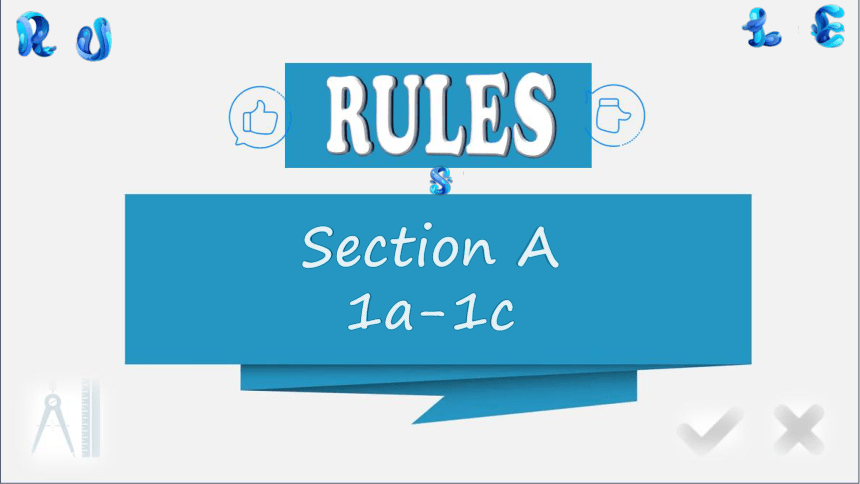
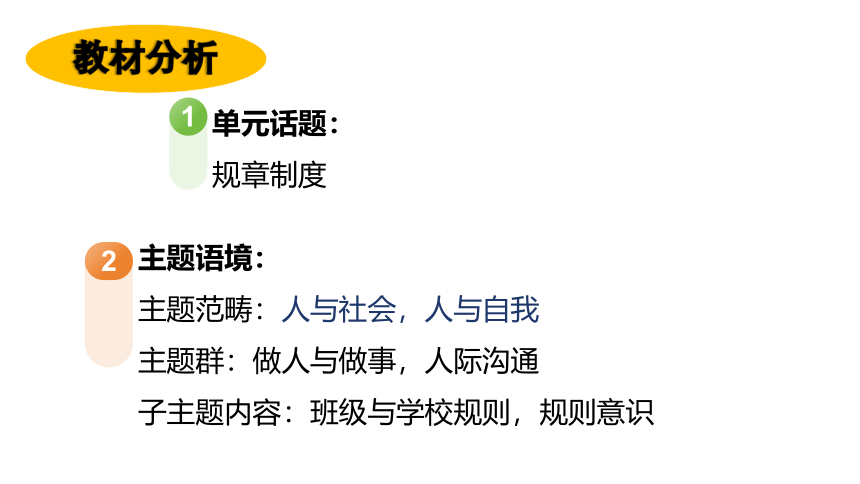
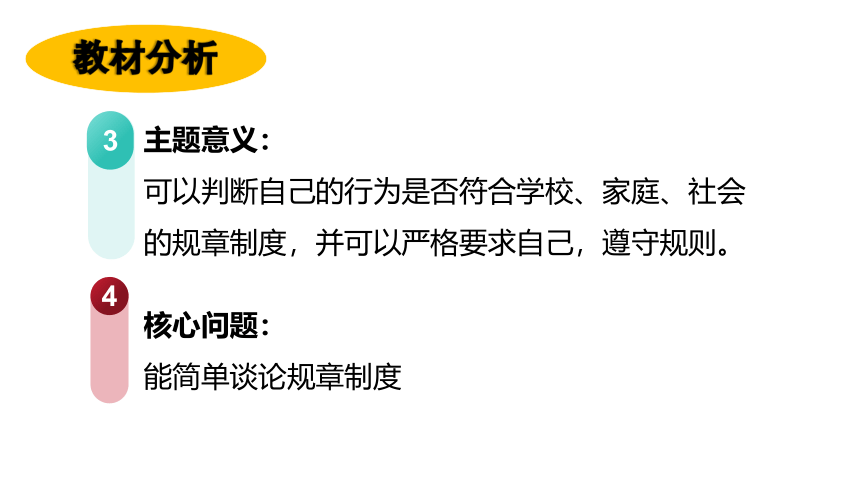
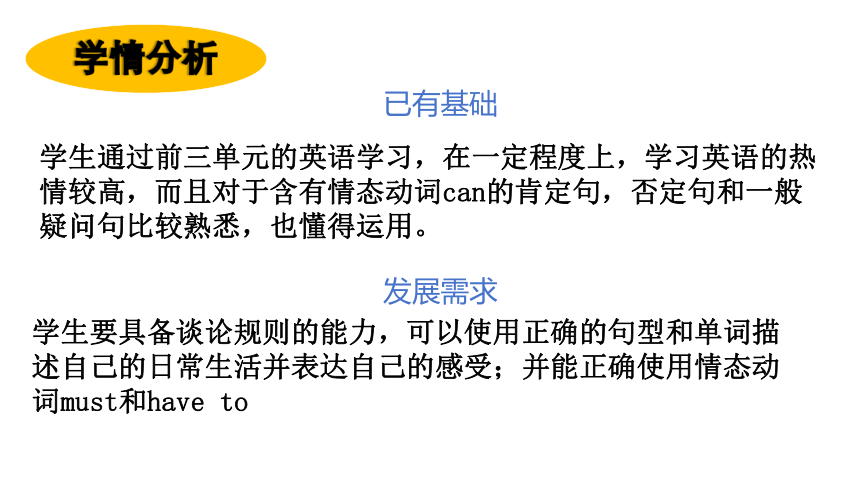

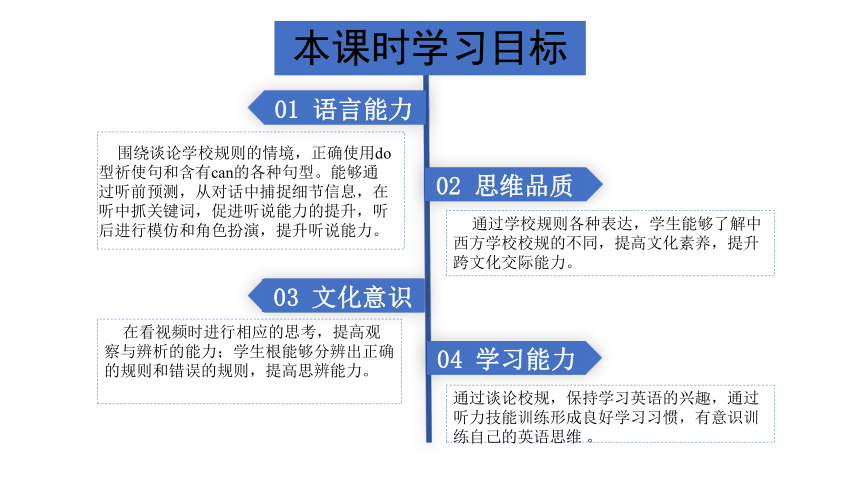


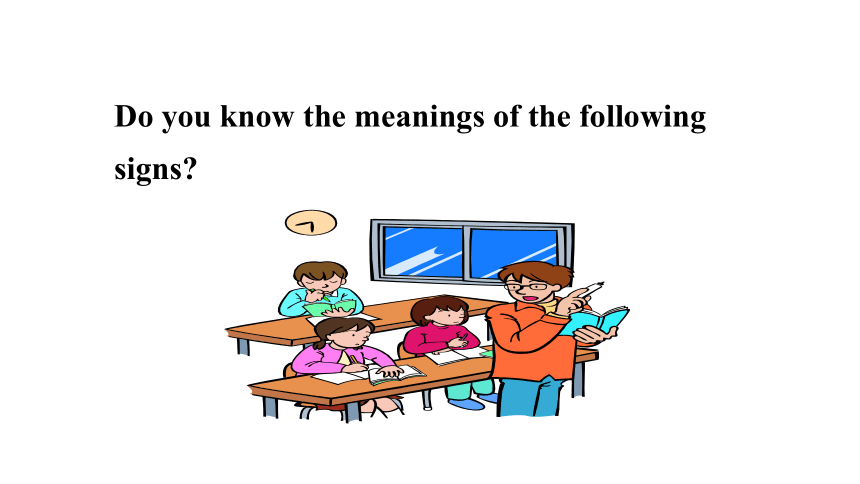

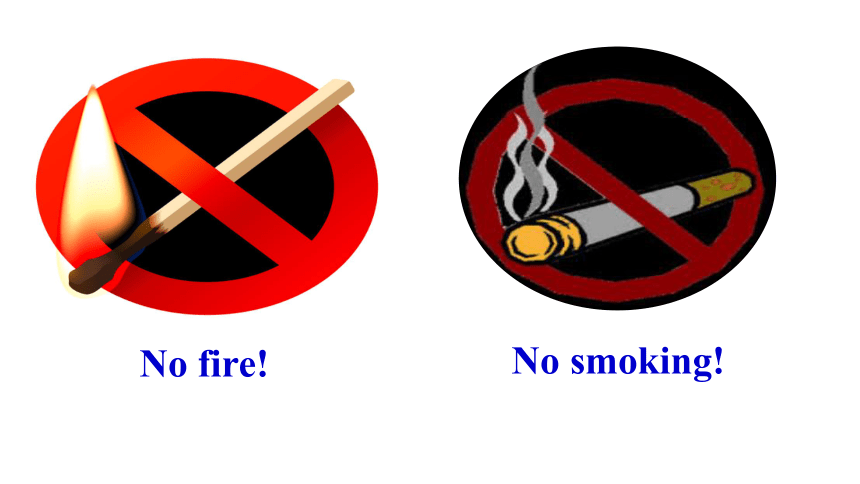
文档简介
(共39张PPT)
Don’t eat in class.
Unit 4
Section A
1a-1c
教材分析
2
主题语境:
主题范畴:人与社会,人与自我
主题群:做人与做事,人际沟通
子主题内容:班级与学校规则,规则意识
1
单元话题:
规章制度
教材分析
4
核心问题:
能简单谈论规章制度
3
主题意义:
可以判断自己的行为是否符合学校、家庭、社会的规章制度,并可以严格要求自己,遵守规则。
学情分析
已有基础
发展需求
学生通过前三单元的英语学习,在一定程度上,学习英语的热情较高,而且对于含有情态动词can的肯定句,否定句和一般疑问句比较熟悉,也懂得运用。
学生要具备谈论规则的能力,可以使用正确的句型和单词描述自己的日常生活并表达自己的感受;并能正确使用情态动词must和have to
学情分析
存在问题
发展途径
但学生对于学生对于规则的描述含糊不清;也不能很客观的认识和看待规则;学生在语法学习和发音上存在细节问题,如no和don't还有can't 在表达“禁止”时的区别,can't的弱读规则等;缺乏心理疏导的途径和方法
通过听读输入和说的输出,训练词汇和句型,在小组对话和同桌对话中夯实所学,听懂询问能力的对话;通过分析3a部分的文章的内容和结构,进行仿写,学会如何描述自己的日常生活并表达自己的感受。
本课时学习目标
01 语言能力
02 思维品质
03 文化意识
04 学习能力
通过学校规则各种表达,学生能够了解中西方学校校规的不同,提高文化素养,提升跨文化交际能力。
在看视频时进行相应的思考,提高观察与辨析的能力;学生根能够分辨出正确的规则和错误的规则,提高思辨能力。
通过谈论校规,保持学习英语的兴趣,通过听力技能训练形成良好学习习惯,有意识训练自己的英语思维 。
围绕谈论学校规则的情境,正确使用do型祈使句和含有can的各种句型。能够通过听前预测,从对话中捕捉细节信息,在听中抓关键词,促进听说能力的提升,听后进行模仿和角色扮演,提升听说能力。
Let’s guess.
A Chinese saying(中国谚语):_________________
无规矩不成方圆。
Nothing can be accomplished without norms or standards.
keep rules.
break rules.
遵守规则
违反规则
Living in the society,
we have to
we can’t
Do you know the meanings of the following signs
No talking!
No walking!
No fire!
No smoking!
No eating. No drinking.
Do you know the places that have rules And what rules do you know
school rules
class rules
family rules
library rules
dining rules
校规
班规
图书馆规则
就餐规则
家规
What can we do at school
What can’t we do at school
Discussion
be late for class = arrive late for class
A: Can we be late for class
B: No, we can’t. We can’t be late for class.
Don’t be late for class.
Don’t eat in the classroom.
A: Can we eat in the classroom
B: No, we can’t. We can’t eat in the classroom.
We can eat in the dining hall.
A: Can we eat in the dining hall
B: Yes, we can eat in the dining hall.
A: Can we run in the hallways
B: No, we can’t. We can’t run
in the hallways.
Don’t run in the hallways.
A: Can we listen to music in class
B: No, we can’t. We can’t listen to music in class.
Don’t listen to music in class.
A: Can you fight
B: No, we can’t. We can’t fight.
Don’t fight.
1a Which rules are these students breaking Write the number of the rule next to the student.
SCHOOL RULES
1. Don’t arrive late for class. You must be on time.
2. Don’t run in the hallways.
3. Don’t eat in the classroom. You must eat in the dining hall.
4. Don’t listen to music in class.
5. Don’t fight.
1b Listen. What rules are these students breaking Write the numbers after the names.
Peter ___ Amy ____ Mike ____
4
2
3
1c Student A is a new student. Student B tells Student A about the rules above.
A: What are the rules
B: Well, we can’t arrive late for class.
We must be on time.
Wet Floor
Emergency Exit
No mobile phones!
No pets allowed!
1. arrive vi. 到达
When did he arrive yesterday
昨天他什么时候到达的?
小结:
arrive + in (大地方)
at (小地方)
get 必须与to 搭配才能加宾语。后面如接地点副词,则不用介词to。
Language points
arrive in / at与get to 的区别
① My father arrived in / got to Beijing this morning.
我爸爸今天上午到达了北京。
② The farmer arrived at / got to an old house and knocked at the door. 那个农民到达了一个旧房子前并且敲了敲门。
– When did your uncle ______ in Shanghai
– The day before yesterday.
A. arrive B. get
If you _____ too late, the host will be unhappy.
A. arrive B. get to C. arrive at
_____________ (not arrive) late for class.
A
A
Don’t arrive
2. 1) must 作为情态动词,表示“必须”、“务必”,有时还表示“一定”,起到加强语气的作用。例如:
You must come tomorrow.
你(们)明天必须要来。
在回答must引起的问句时,如果是否定的答复,可用don’t have to或needn’t (不必) , 但不能用mustn’t (一定不, 必须不, 不允许, 不得) 。
--- ______ ask you some questions
--- Sure.
A. Do you B. Will you
C. Can I D. Must I
-Dad, may I watch TV
-No, you can’t. You _______ finish your homework first.
A. must B. can C. may
C
A
2) on time 是一个固定介词短语,表示“按时;准时”。 例如:
We must get to school on time.
我们必须按时到校。
我们要按时完成任务。
We'll finish our job _________.
on time
3) 系动词be与形容词或介词短语联用,是英语一种常见的语句结构,表示某种状态。例如:
be quiet 保持安静;be strict 要求严格
be on time 守时;按时到
be at work 在上班
例如:
You mustn’t be noisy, children.
孩子们,你们一定不能喧闹。
3. listen to … 听……
She is listening to the radio.
她在听收音机。
listen at the door 耳朵贴着门听
listen for … 留神等着听…
listen for an answer 等着听回答
listen to a lecture 听讲座
listen to advice 听从劝告
祈使句
1.祈使句是表示命令、叮嘱、号召等的句子;
2.通常省略主语you;
3.句中谓语动词用动词原形;
4.祈使句有肯定和否定两种:
Don’t eat in class.
Don’t play sports in the classroom.
Don’t fight.
Come in, please! 请进!
Sit down, please. 请坐。
否定
肯定
按要求完成下列句子。
1. 不要在课堂上说话。(翻译句子)
Don't talk _______.
2. 我姐姐喜欢晚饭后听音乐。(翻译句子)
My sister likes to ______________after dinner.
3. 火车能准时到达吗?(翻译句子)
Can the train arrive________
4. 明天的晚会别迟到啊。(翻译句子)
Don't __________________ the party tomorrow.
5. We can talk in the hallways.(改为否定句)
We __________ in the hallways.
in class
listen to music
on time
arrive/be late for
can't talk
Exercises
6. You can't play the piano at night.(改为祈使句)
___________ the piano at night.
7. The students can't be late for school.(改为同义句)
The students can't ____________ for school.
Don't play
arrive late
肯定祈使句 否定祈使句
Sit down.
Come in.
Eat at home.
Listen to music outside.
5. Do your homework at school.
Don’t sit down.
Don’t come in .
Don’t eat at home.
Don’t listen to music outside.
Don’t do your homework at school.
Summary
Homework
1. Finish the exercises. (A)
2. Talk about the rules in your class. (B)
Find out the easy and difficult rules in your class and talk to your class.
Add or cross out some rules if you think it is a must. (C)
Thank you !
Don’t eat in class.
Unit 4
Section A
1a-1c
教材分析
2
主题语境:
主题范畴:人与社会,人与自我
主题群:做人与做事,人际沟通
子主题内容:班级与学校规则,规则意识
1
单元话题:
规章制度
教材分析
4
核心问题:
能简单谈论规章制度
3
主题意义:
可以判断自己的行为是否符合学校、家庭、社会的规章制度,并可以严格要求自己,遵守规则。
学情分析
已有基础
发展需求
学生通过前三单元的英语学习,在一定程度上,学习英语的热情较高,而且对于含有情态动词can的肯定句,否定句和一般疑问句比较熟悉,也懂得运用。
学生要具备谈论规则的能力,可以使用正确的句型和单词描述自己的日常生活并表达自己的感受;并能正确使用情态动词must和have to
学情分析
存在问题
发展途径
但学生对于学生对于规则的描述含糊不清;也不能很客观的认识和看待规则;学生在语法学习和发音上存在细节问题,如no和don't还有can't 在表达“禁止”时的区别,can't的弱读规则等;缺乏心理疏导的途径和方法
通过听读输入和说的输出,训练词汇和句型,在小组对话和同桌对话中夯实所学,听懂询问能力的对话;通过分析3a部分的文章的内容和结构,进行仿写,学会如何描述自己的日常生活并表达自己的感受。
本课时学习目标
01 语言能力
02 思维品质
03 文化意识
04 学习能力
通过学校规则各种表达,学生能够了解中西方学校校规的不同,提高文化素养,提升跨文化交际能力。
在看视频时进行相应的思考,提高观察与辨析的能力;学生根能够分辨出正确的规则和错误的规则,提高思辨能力。
通过谈论校规,保持学习英语的兴趣,通过听力技能训练形成良好学习习惯,有意识训练自己的英语思维 。
围绕谈论学校规则的情境,正确使用do型祈使句和含有can的各种句型。能够通过听前预测,从对话中捕捉细节信息,在听中抓关键词,促进听说能力的提升,听后进行模仿和角色扮演,提升听说能力。
Let’s guess.
A Chinese saying(中国谚语):_________________
无规矩不成方圆。
Nothing can be accomplished without norms or standards.
keep rules.
break rules.
遵守规则
违反规则
Living in the society,
we have to
we can’t
Do you know the meanings of the following signs
No talking!
No walking!
No fire!
No smoking!
No eating. No drinking.
Do you know the places that have rules And what rules do you know
school rules
class rules
family rules
library rules
dining rules
校规
班规
图书馆规则
就餐规则
家规
What can we do at school
What can’t we do at school
Discussion
be late for class = arrive late for class
A: Can we be late for class
B: No, we can’t. We can’t be late for class.
Don’t be late for class.
Don’t eat in the classroom.
A: Can we eat in the classroom
B: No, we can’t. We can’t eat in the classroom.
We can eat in the dining hall.
A: Can we eat in the dining hall
B: Yes, we can eat in the dining hall.
A: Can we run in the hallways
B: No, we can’t. We can’t run
in the hallways.
Don’t run in the hallways.
A: Can we listen to music in class
B: No, we can’t. We can’t listen to music in class.
Don’t listen to music in class.
A: Can you fight
B: No, we can’t. We can’t fight.
Don’t fight.
1a Which rules are these students breaking Write the number of the rule next to the student.
SCHOOL RULES
1. Don’t arrive late for class. You must be on time.
2. Don’t run in the hallways.
3. Don’t eat in the classroom. You must eat in the dining hall.
4. Don’t listen to music in class.
5. Don’t fight.
1b Listen. What rules are these students breaking Write the numbers after the names.
Peter ___ Amy ____ Mike ____
4
2
3
1c Student A is a new student. Student B tells Student A about the rules above.
A: What are the rules
B: Well, we can’t arrive late for class.
We must be on time.
Wet Floor
Emergency Exit
No mobile phones!
No pets allowed!
1. arrive vi. 到达
When did he arrive yesterday
昨天他什么时候到达的?
小结:
arrive + in (大地方)
at (小地方)
get 必须与to 搭配才能加宾语。后面如接地点副词,则不用介词to。
Language points
arrive in / at与get to 的区别
① My father arrived in / got to Beijing this morning.
我爸爸今天上午到达了北京。
② The farmer arrived at / got to an old house and knocked at the door. 那个农民到达了一个旧房子前并且敲了敲门。
– When did your uncle ______ in Shanghai
– The day before yesterday.
A. arrive B. get
If you _____ too late, the host will be unhappy.
A. arrive B. get to C. arrive at
_____________ (not arrive) late for class.
A
A
Don’t arrive
2. 1) must 作为情态动词,表示“必须”、“务必”,有时还表示“一定”,起到加强语气的作用。例如:
You must come tomorrow.
你(们)明天必须要来。
在回答must引起的问句时,如果是否定的答复,可用don’t have to或needn’t (不必) , 但不能用mustn’t (一定不, 必须不, 不允许, 不得) 。
--- ______ ask you some questions
--- Sure.
A. Do you B. Will you
C. Can I D. Must I
-Dad, may I watch TV
-No, you can’t. You _______ finish your homework first.
A. must B. can C. may
C
A
2) on time 是一个固定介词短语,表示“按时;准时”。 例如:
We must get to school on time.
我们必须按时到校。
我们要按时完成任务。
We'll finish our job _________.
on time
3) 系动词be与形容词或介词短语联用,是英语一种常见的语句结构,表示某种状态。例如:
be quiet 保持安静;be strict 要求严格
be on time 守时;按时到
be at work 在上班
例如:
You mustn’t be noisy, children.
孩子们,你们一定不能喧闹。
3. listen to … 听……
She is listening to the radio.
她在听收音机。
listen at the door 耳朵贴着门听
listen for … 留神等着听…
listen for an answer 等着听回答
listen to a lecture 听讲座
listen to advice 听从劝告
祈使句
1.祈使句是表示命令、叮嘱、号召等的句子;
2.通常省略主语you;
3.句中谓语动词用动词原形;
4.祈使句有肯定和否定两种:
Don’t eat in class.
Don’t play sports in the classroom.
Don’t fight.
Come in, please! 请进!
Sit down, please. 请坐。
否定
肯定
按要求完成下列句子。
1. 不要在课堂上说话。(翻译句子)
Don't talk _______.
2. 我姐姐喜欢晚饭后听音乐。(翻译句子)
My sister likes to ______________after dinner.
3. 火车能准时到达吗?(翻译句子)
Can the train arrive________
4. 明天的晚会别迟到啊。(翻译句子)
Don't __________________ the party tomorrow.
5. We can talk in the hallways.(改为否定句)
We __________ in the hallways.
in class
listen to music
on time
arrive/be late for
can't talk
Exercises
6. You can't play the piano at night.(改为祈使句)
___________ the piano at night.
7. The students can't be late for school.(改为同义句)
The students can't ____________ for school.
Don't play
arrive late
肯定祈使句 否定祈使句
Sit down.
Come in.
Eat at home.
Listen to music outside.
5. Do your homework at school.
Don’t sit down.
Don’t come in .
Don’t eat at home.
Don’t listen to music outside.
Don’t do your homework at school.
Summary
Homework
1. Finish the exercises. (A)
2. Talk about the rules in your class. (B)
Find out the easy and difficult rules in your class and talk to your class.
Add or cross out some rules if you think it is a must. (C)
Thank you !
同课章节目录
- Unit 1 Can you play the guitar?
- Section A
- Section B
- Unit 2 What time do you go to school?
- Section A
- Section B
- Unit 3 How do you get to school?
- Section A
- Section B
- Unit 4 Don't eat in class.
- Section A
- Section B
- Unit 5 Why do you like pandas?
- Section A
- Section B
- Unit 6 I'm watching TV.
- Section A
- Section B
- Review of Units 1-6
- Unit 7 It's raining!
- Section A
- Section B
- Unit 8 Is there a post office near here?
- Section A
- Section B
- Unit 9 What does he look like?
- Section A
- Section B
- Unit 10 I'd like some noodles.
- Section A
- Section B
- Unit 11 How was your school trip?
- Section A
- Section B
- Unit 12 What did you do last weekend?
- Section A
- Section B
